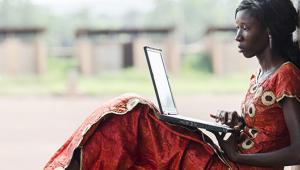International development secretary Penny Mordaunt pledged today to give £225m to the Global Partnership for Education over three years. The partnership brings together a range of stakeholders including donors, civil society, teacher organisations and the private sector to strengthen education systems in developing countries.
An international pledge drive, taking place in Senegal today, is seeking to raise a total $3.1bn from donors for the next cycle, which runs from 2018 to 2020.
This UK’s £225m contribution represents an almost 50% increase compared to current annual contributions, the British government said.
But Stephen Twigg, international development committee chair, and Conservative MP Henry Smith, the committee’s rapporteur on education, said: “We are very disappointed that the UK pledge falls so far short of our recommendation.”
They stressed the importance of education if countries are to progress out of poverty.
“The secretary of state has announced a pledge of £225m over three years to the Global Partnership for Education, saying this is an increase of almost 50%. In the last replenishment, DfID pledged £300m over four years – the exact same per year figure as this time,” they said.
The select committee also highlighted that DfID had only delivered £210m of the £300m in the last funding round. This was because of a 15% cap on the UK’s total contribution to the partnership.
This cap “remains in place this time round”. DfID said in a statement and the UK’s final contribution will be limited to 15% of the final replenishment amount.
Twigg and Smith said: “The UK has played a leading role in supporting the [Global Partnership for Education]. It is vital that this continues despite the disappointing level of the UK pledge today. We regard the global partnership as a highly credible and effective vehicle for global education.”
Kate Osamor, Labour's shadow secretary of state for international development, also said that the government had failed to make a “substantial, early pledge” as it did not follow the recommendations of the select committee.
She said: “While it may sound like a lot of money, this is a deeply dispiriting announcement from the government that now leaves a £125m hole in the Global Partnership for Education’s finances... It will also mean millions of the world’s poorest children miss out on the chance of an education and their best route out of poverty.”
Speaking at a global education conference hosted by France and Senegal today, Mordaunt said the UK was stepping up its work to tackle this “terrible waste of potential”.
The ONE campaign group has called on world leaders to make “ambitious pledges” to fund education and help get more than 130 million girls into school.
Mordaunt also urged governments to reform their own education systems.
She said: “We need an education revolution, but to succeed in tackling this global learning crisis, we will not just need to be open-hearted – we need to be hard-headed too.
“The UK will lead the way by supporting countries’ governments to fundamentally overhaul their education systems to make sure they can ultimately step up and provide a good education for their own people.”
Between 2012 and 2015, the UK spent an annual average of £966m per year on education. In the period between 2015 and 2017, the department supported 7.1 million children gain an education, including at least 3.3 million girls.







